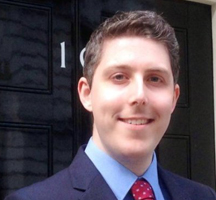How did you get into public affairs? What was your first job and what did you learn most from this role?
I started out as an advisor to a parliamentarian. Understanding the inner mechanics of party politics, the constituency dynamics and of course the parliamentary aspects was a valuable introduction to public affairs. I was initially drawn to advocacy roles before moving to an in-house function.
What sparked your interest in EU public affairs? What do you enjoy most about working in European/International public affairs?
A long standing fascination with global institutions and an awareness that the key public policy challenges of our time are increasingly being resolved at an international level. EU public affairs is complex yet rewarding and the mechanics of engagement across such diverse stakeholder bases – from the Commission to the Parliament to the Member State Governments themselves, is a truly enjoyable challenge.
The opportunity to shape and influence policy at this level is terrific and I relish being the eyes and ears for UK small businesses at an EU level, acting in their interests and with their full support.
What does your current role entail on a day-to-day basis?
A large portion of my day is spent engaging with stakeholders – members, politicians, officials, other business groups – you name it! Advising members on policy positioning, lobbying politicians, working with officials on working groups, coordinating FSB engagement within my brief with colleagues in the other business groups.
I might be asked to weigh in on a press comment, draft copy, brief members, assess a new policy proposal, advise on a campaign or develop an engagement strategy.
I’m in Brussels usually two to three days a week during peak season and a significant amount of my day will be consumed in meetings with MEPs –the record was 30 meetings in one day! It’s also important to get out of the European Parliament and make time for key officials, in the Commission, Council or the Perm Reps, the other leading business groups and of course our own trade association, EMOTA.
As Head of Political Engagement for Pride in London, you enhanced the organisation’s profile and broadened support across the political spectrum. How did you go about engaging with politicians?
In a country where you can marry your same-sex partner but be attacked for holding their hand in public, it’s clear much remains to be done. I wanted to use Pride as an anchor to engage with politicians and remind them of the challenges ahead, combatting the consensus in parliament and elsewhere that marriage equality somehow heralded an end to the movement. Working with politicians of diverse backgrounds and party affiliations, we sought to share stories from members of the community to bring to life the challenges which still exist for many LGBT+ Londoners. The real value in this approach is that you are helping to educate politicians on a topic they may not fully understand and you empower them to take up the baton as an ally.
What makes for a good communicator?
Effective communication is only possible when you truly understand your audience. Be personal, factual and specific. Listen. Ask questions. Learn how to read body language. Don’t be afraid to clarify.
Which campaign/issue are you most proud to have been involved in?
I’m proud to have led a robust national campaign during the EU referendum to address the information deficit amongst the small business community in the UK and ensure clear and concise information, fact-checked by the well renowned FullFact was distributed to business owners across the UK.
What’s been the best piece of career advice you’ve been given?
Choose your roles wisely. I’ve been fortunate to work on issues I’m passionate about and wholeheartedly support.
How important is postgraduate study to a public affairs career? How relevant is Degree subject for a public affairs career?
From my perspective, having studied law and international public policy, it certainly provided a foundation that was helpful when starting out. Whether being able to read legislative amendments and make sense of the chaos, understand the legal principles at play or the geo-political perspective, I was stronger entering this profession with my educational background.
What advice would you give to someone considering a career in public affairs?
An internship is almost inevitable. Plan for it and make sure you use it to progress – that means taking personal responsibility for acquiring more demanding tasks, proactively seeking out opportunities to take a back seat and watch senior colleagues at work and building your contact book from day one.
Which skills are key for a successful career as public affairs practitioner?
An excellent communicator combined with a diplomatic personality and the ability to grasp highly technical policy quickly.
Which professional training courses have you taken?
I’ve undertaken various public speaking, project management and media training courses and they really enable you to step up and take on new challenges.
How important is completing a stage in the European institutions to a career in EU public affairs?
For me it all depends on the expertise more broadly. I’ve definitely come across people who have done a stage and then expect it to get them a job. I think hard work and perseverance, combined with winning references and a solid knowledge of the basics will open just as many doors. I’ve never done a stage and haven’t felt it held me back.














